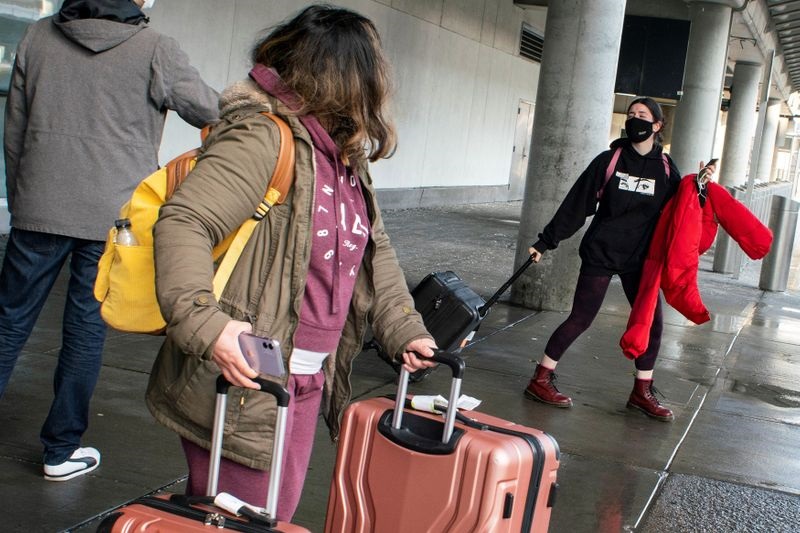* Philippine capital under partial restrictions since August
* Continued restrictions may hamper recovery - govt official
* Relaxes entry for foreigners with visas, spouses of
Filipinos
(Recasts with extension of curbs, adds detail, context)
MANILA, Jan 29 (Reuters) - The Philippines extended on
Friday partial COVID-19 restrictions in the capital Manila until
the end of February in a bid to slow a spike in infections after
year-end holidays, officials said, warning the curbs could
further delay economic recovery.
From one of Asia's fastest growing nations before the
pandemic, the Philippines suffered its worst economic decline in
2020 as a strict coronavirus lockdown shuttered businesses and
put millions out of work.
The Manila region, which accounts for 40% of the country's
economic output and is home to at least 12 million people,
remains the epicentre for the outbreak in the Philippines, which
has the second-highest case load in Southeast Asia.
Some curbs have been gradually eased, but a new rise in the
number of coronavirus infections and local transmission of a
more contagious COVID-19 variant have prevented the Philippines
from reopening its economy faster.
The presidential spokesman confirmed in a statement
restrictions that include limited operations at shopping malls
and dine-in eateries, as well as curbs on gatherings and public
transport capacity, would be prolonged.
Acting economic planning chief Karl Kendrick Chua separately
warned the country must learn to live with the virus to avoid
derailing an economic recovery.
"There's no country that I know with a level of quarantine
that is so broad, so deep and so long", Chua told foreign
correspondents on Friday.
The Philippine economy contracted 9.5% in 2020, the biggest
slump on record. Manila on Friday also relaxed travel curbs on foreigners
coming from more than 30 countries, including the United States
and China, that have detected cases of the more contagious
British variant of the coronavirus starting from next month.
The move covers foreigners previously allowed to enter the
Philippines, including those holding work visas and spouses of
Filipinos, but tourists would remain banned.
- English (USA)
- English (UK)
- English (India)
- English (Canada)
- English (Australia)
- English (South Africa)
- English (Nigeria)
- Deutsch
- Español (España)
- Español (México)
- Français
- Italiano
- Nederlands
- Português (Portugal)
- Polski
- Português (Brasil)
- Русский
- Türkçe
- العربية
- Ελληνικά
- Svenska
- Suomi
- עברית
- 日本語
- 한국어
- 简体中文
- 繁體中文
- Bahasa Indonesia
- Bahasa Melayu
- ไทย
- Tiếng Việt
- हिंदी
UPDATE 1-Philippines extends partial coronavirus curbs in Manila
Published 01/29/2021, 03:15 PM
Updated 01/29/2021, 03:20 PM
UPDATE 1-Philippines extends partial coronavirus curbs in Manila

Latest comments
Install Our App
Risk Disclosure: Trading in financial instruments and/or cryptocurrencies involves high risks including the risk of losing some, or all, of your investment amount, and may not be suitable for all investors. Prices of cryptocurrencies are extremely volatile and may be affected by external factors such as financial, regulatory or political events. Trading on margin increases the financial risks.
Before deciding to trade in financial instrument or cryptocurrencies you should be fully informed of the risks and costs associated with trading the financial markets, carefully consider your investment objectives, level of experience, and risk appetite, and seek professional advice where needed.
Fusion Media would like to remind you that the data contained in this website is not necessarily real-time nor accurate. The data and prices on the website are not necessarily provided by any market or exchange, but may be provided by market makers, and so prices may not be accurate and may differ from the actual price at any given market, meaning prices are indicative and not appropriate for trading purposes. Fusion Media and any provider of the data contained in this website will not accept liability for any loss or damage as a result of your trading, or your reliance on the information contained within this website.
It is prohibited to use, store, reproduce, display, modify, transmit or distribute the data contained in this website without the explicit prior written permission of Fusion Media and/or the data provider. All intellectual property rights are reserved by the providers and/or the exchange providing the data contained in this website.
Fusion Media may be compensated by the advertisers that appear on the website, based on your interaction with the advertisements or advertisers.
Before deciding to trade in financial instrument or cryptocurrencies you should be fully informed of the risks and costs associated with trading the financial markets, carefully consider your investment objectives, level of experience, and risk appetite, and seek professional advice where needed.
Fusion Media would like to remind you that the data contained in this website is not necessarily real-time nor accurate. The data and prices on the website are not necessarily provided by any market or exchange, but may be provided by market makers, and so prices may not be accurate and may differ from the actual price at any given market, meaning prices are indicative and not appropriate for trading purposes. Fusion Media and any provider of the data contained in this website will not accept liability for any loss or damage as a result of your trading, or your reliance on the information contained within this website.
It is prohibited to use, store, reproduce, display, modify, transmit or distribute the data contained in this website without the explicit prior written permission of Fusion Media and/or the data provider. All intellectual property rights are reserved by the providers and/or the exchange providing the data contained in this website.
Fusion Media may be compensated by the advertisers that appear on the website, based on your interaction with the advertisements or advertisers.
© 2007-2025 - Fusion Media Limited. All Rights Reserved.